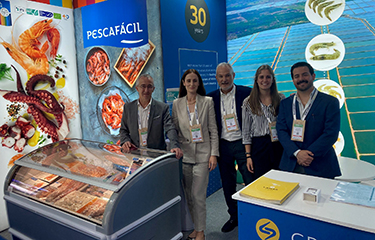Grupo Lamar is poised to boost production even further, despite the challenges of operating in Venezuela, which has been beset by political and economic woes.
The Maracaibo, Venezuela-based company produced around 45,000 metric tons (MT) of vannamei shrimp in 2022, and is aiming for 50,000 to 60,000 MT in 2023, according to Grupo Lamar Board Chairman Luis Comella Barboza.
Five years ago, the company had just 3,000 MT of production, Comella Barboza said, but through the purchase of smaller shrimp farms that have struggled to continue to operate under the U.S. sanctions against in the South American country, Grupo Lamar has expanded rapidly.
“It’s a disaster. Logistics and financing are becoming very difficult in Venezuela. You can’t find any bank willing to give a loan to a small shrimp company,” he told SeafoodSource at the 2023 Seafood Expo Global. “For them, the situation is getting worse and worse.”
Grupo Lamar now accounts for 80 percent of Venezuela’s total shrimp production, operating 32 farms, two aquafeed plants, five hatcheries, and five processing plants. It has grown its annual revenue to USD 200 million (EUR 181 million). But Comella Barboza said the company has to continue to grow to survive.
“The bigger you are, the better the cost price will be per kilo, and that what we're doing,” he said.
Knowing it can’t compete against shrimp superpower Ecuador, which can export its products for USD 0.10 to USD 0.15 (EUR 0.09 to EUR 0.14) less per kilo, primarily because it has to send its shrimp via Panama due to a lack of shipping options, Grupo Lamar has focused on the niche of selling small-sized shrimp into Europe.
“With the small sizes, we can do five to six cycles a year and the kind of genetics and water temperature and quality, it would be very expensive to grow them larger. We did the math and saw our most cost-effective type of production was to keep sizes between 60-70 [count] to 70-80, only sometimes going as big as 40-50 and as small as 120.”
Comella Barboza said Grupo Lamar aims for a 30- to 45-day crop, and said with a robust genetics program, the company has improved the survival rates for its shrimp and their speed of growth. All of the company’s shrimp has Aquaculture Stewardship Council and Best Aquaculture Practices 4-Star certification, he noted.
In 2018, to facilitate and improve Grupo Lamar’s business in Europe, Comella Barboza and Lamar purchased a 51 percent stake in Burgos, Spain-based Pescafácil, which previously focused on processing and marketing cephalopod products. The company now processes 1,500 to 2,000 MT of Grupo Lamar shrimp annually at its facility in Burgos, along with another 2,500 MT of shrimp sourced from other companies – primarily Ecuadorian – to fill out its product range. Around 85 percent of its sales are within Spain, with Portugal, France, and Canada serving as secondary markets.
“Shipping product from Venezuela to Spain, you have to pay 12 percent taxes unless you sell to companies that are going to process the shrimp, transform it into what is considered to be a different product,” Comella Barboza said. “So we send all of the shrimp Pescafácil buys from Grupo Lamar whole frozen and raw. We aren’t allowed to provide better prices from Grupo Lamar, because we don’t want to be accused of dumping, but what the relationship gives us is we have the ability to shape the inventory in terms of securing product for our processing. That's a good advantage.”
Comella Barboza said Pescafácil continues to be run by the family that owned it before the acquisition, but that he works on strategy, image improvement, and networking.
“I try to understand the strategy and trying to help with relation with the suppliers, and I’m also trying to help the company to improve its image to make it more competitive and better-known in the European market,” he said. “Ecuador has created a brand. Ecuadorian shrimp is very good, but ours is as good as theirs. But in terms of marketing, they are doing an excellent job. We are alone representing Venezuela, so there’s a lot of work to do. We try to differentiate ourselves with our products and by giving better service, because we’re small so we can give more personalized attention to our clients.”
Pescafácil, which over the past five years has increased its sales from ...
Photo by Cliff White/SeafoodSource








